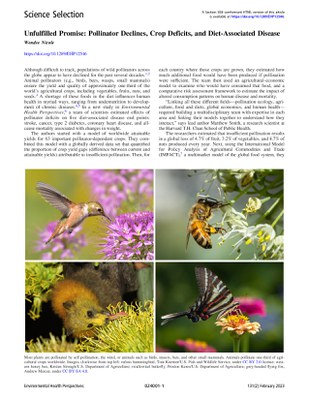Unfulfilled Promise: Pollinator Declines, Crop Deficits, and Diet-Associated Disease

In a new study in Environmental Health Perspectives, a team of scientists estimated effects of pollinator deficits on five diet-associated disease end points: stroke, cancer, type 2 diabetes, coronary heart disease, and all-cause mortality associated with changes in weight.
Although difficult to track, populations of wild pollinators across the globe appear to have declined for the past several decades. Animal pollinators (e.g., birds, bees, wasps, small mammals) ensure the yield and quality of approximately one-third of the world’s agricultural crops, including vegetables, fruits, nuts, and seeds. A shortage of these foods in the diet influences human health in myriad ways, ranging from undernutrition to development of chronic diseases.


